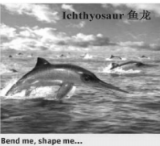题目内容
13.The family does not feature heavily in the culture of the Ik of Northern Uganda.In fact,as far as the Ik are concerned,the family means very little.This is because the Ik face a daily struggle to survive in the face of drought,famine and starvation.Anyone who cannot take care of himself or herself is regarded as a useless burden by the Ik and a threat to the survival of the others.So the old are abandoned to die.Sick and disabled children too are abandoned.The Ik attitude is that,as long as you keep the breeding group alive,you can always get more children.Ik mothers throw their children out of the village compound when they are 3years old,to defend for themselves.I imagine children must be rather relieved to be thrown out,for in the process of being cared for,he or she is reluctantly carried about in a hide sling(背婴儿带) wherever the mother goes.Whenever the mother is in her field,she loosens the sling and lets the baby to the ground none too slowly,and laughs if it is hurt.Then she goes about her business,leaving the child there,almost hoping that some fierce animals will come along and carry it off.This sometimes happens.Such behaviour does not endear children to their parents or parents to their children.
Many of you probably reacted to the Ik with some horror and shock.It is very tempting to conclude that these people are primitive,savage and inhuman,and that their concept of the‘family'is deeply wrong.However,sociologists argue that it is wrong to simply judge such societies and their family arrangements as unnatural and untypical.We need to understand that such arrangements may have positive functions.In the case of the Ik,with the exceptional circumstances they find themselves in-drought and famine-their family arrangements help ensure the survival of the tribe.
Moreover,some of you may have concluded that British family life and the Ik have some things in common.British family is not universally experienced as positive for all family members.For some members of our own society-for young and old alike-family life may be characterized by violence,abuse and isolation.
The problem with studying the family is that we all think we are experts.This is not surprising,considering that most of us are born in families and socialized into family roles and responsibilities.It is an institution most of us feel very comfortable with and regard as‘natural'.For many of us,it is a cornerstone of our social world,a place to which we can retreat and take refuge from the stresses of the outside world.It is the place in which we are loved for who we are,rather than what we are.Family living and family events are probably the most important aspects of our lives.It is no wonder that we tend to hold very fierce,emotional,and perhaps irrational views about family life and how it ought to be organized.Such‘taken for granted'views make it very difficult for us to objectively examine family arrangements that differ from our own experience-such as those of the Ik-without making critical judgments.
32.Which of the following ideas do the Ik hold according to the passage?A
A.The survival of the tribe is what they should strive for.
B.The old are the luxuries they should treasure.
C.Their children should be abandoned when born.
D.The family is the centre of their life.
33.Which of the following will the author probably agree with in the case of Ik?B
A.Mothers prefer to carry their children here and there.
B.The children are a great burden to their family.
C.The children enjoy warm relationship with their parents.
D.Many children should be left at the mercy of fierce animals in the field.
34.According to the author,both British family life and that of the IkD.
A.endear family membersB.ensure longevity
C.experience ups and downsD.contain negative elements
35.All of the following statements support"family is the cornerstone"EXCEPT thatA.
A.we pour our bad mood upon our family members
B.we find we love and are loved in the family
C.we believe family is the top priority in our life
D.we turn to family as our harbour in heart.
分析 本文分析了乌干达北部人没有家庭观念的原因,作者的观点是我们应该客观分析家庭观念这一问题.
解答 32-35 ABDA
32.A 概括总结题.根据文章内容,可知乌干达北部由于长期遭受自然灾害,所以生存才是他们的首要目的,家庭观念薄弱.联系文章主旨,所以选择A选项.
33.B 概括总结题.根据文章内容可知,对于乌干达北部的人来说,孩子是他们的负担.联系文章主旨,所以选择B选项.
34.D 分析推测题.根据文章内容可知,就算英国没有为温饱问题范畴的国家里,人们对家庭观念有些也是负面,从文章family life may be characterized by violence,abuse and isolation..联系文章主旨,所以选择D选项.
35.A 分析推测题.根据文章内容的理解,下列不支持"以家庭观念为主"的一项是,向家人发脾气.联系文章主旨,所以选择A选项.
点评 做阅读时经常犯错的主要原因是,仅凭读过文章后残留在脑海中的一丝印象来勾选答案,这样便很容易掉入出题人故意设布下的题目陷阱.所谓阅读理解,对于题目的理解一定要忠实于原文,因此,每一道题都应该与原文作全面的对比与核查,再得出答案.也就是说,阅读理解的每一道题目,在原文都应该有明确的出处,我们把这一出处叫做原文相关句,(1)排除与原文相关句主题不一致的选项(2)排除与原文相关句态度相反的选项 (3)排除用于过于极端或负面的选项(4)注意结合文章主旨和主题去排除.

练习册系列答案
相关题目
3.He is the only one of the students who ________ a winner of schoolarship for three years.( )
| A. | is | B. | has been | C. | are | D. | have been |
 We've considered several ways of paying to cut inline:hiring line standers,buying tickets from scalpers (票贩子),or purchasing line cutting privileges directly from,say,an airline or an amusement park.Each of these deals replaces the morals of the queue (waiting your turn) with the morals of the market (paying a price for faster service).
We've considered several ways of paying to cut inline:hiring line standers,buying tickets from scalpers (票贩子),or purchasing line cutting privileges directly from,say,an airline or an amusement park.Each of these deals replaces the morals of the queue (waiting your turn) with the morals of the market (paying a price for faster service).